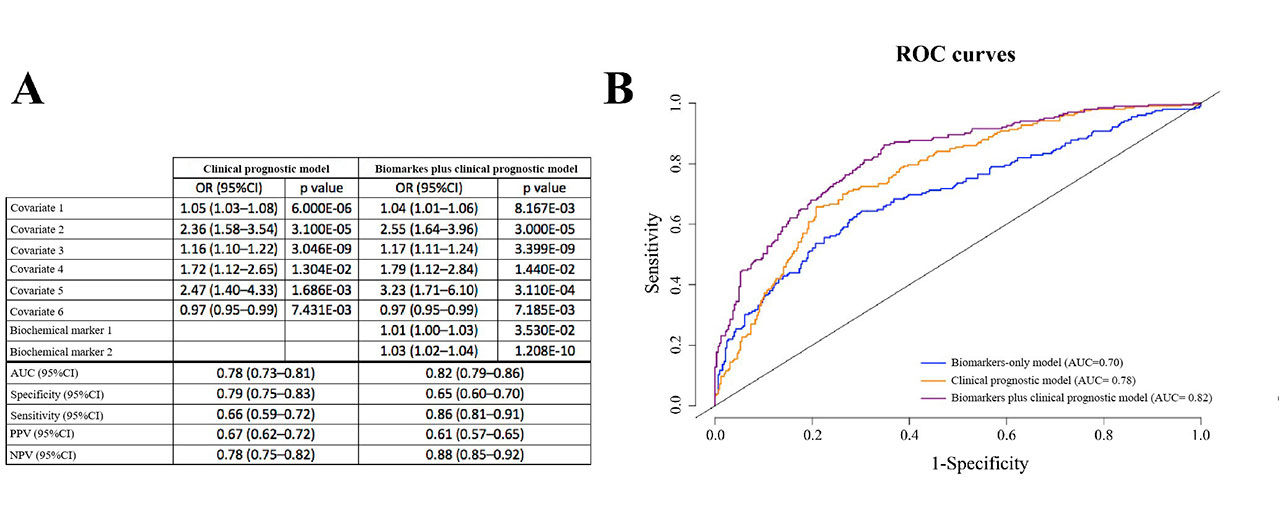Session Information
Session Type: Poster Session (Tuesday)
Session Time: 9:00AM-11:00AM
Background/Purpose: Osteoarthritis (OA) is the most prevalent rheumatic disorder of the middle-age population. The lack of sensitive diagnostics methods led to an identification of the disease in advanced stages, where the only possible treatment is surgery. Therefore, the objective of this work was to validate and qualify the putative ability of 6 potential proteomic markers to predict the appearance of radiographic knee OA in the clinical routine.
Methods: In the validation phase 6 potential biomarkers were quantify in 540 sera at baseline belonging to participants from the Osteoarthritis Initiative (OAI) who will develop (incident group, n=209) or not (not-incident group, n=331) radiographic knee OA in a follow-up period of 96 months using custom sandwich immunoassays for bead-based xMAP technology. Non-parametric Mann-Whitney U test was carried out to look for statistical differences between the outcome groups. In the qualification phase significant association of the biomarkers with the risk of knee OA development was assessed by regression analysis. A clinical prognostic model was defined by stepwise regression analysis using clinical non-radiographic variables significant associated with OA risk assessment. The utility of the potential biomarkers in the clinical routine, alone or in combination with other biomarkers included in the same multiplex sandwich immunoassay, was evaluated by comparing the Area Under the Curve (AUC) of the clinical prognostic model with the different biomarkers plus clinical models. Sensitivity, specificity and predictive coefficients were also assessed.
Results: The incident group showed significant higher serum concentrations of all the potential biomarkers analyzed (p < 0.05). We also found that 5 of the analytes were significant associated with the future appearance of radiographic knee OA, yielding Odd Ratios (OR) ≥ 10 per 10 µg/ml increase. Among all the possible combinations, the inclusion of 2 of the potential biomarkers to the clinical prognostic model showed a significant improvement of the predictive capacity (AUCs = 0.78 vs 0.82, p= 0,044) with 65% (60-70%) specificity and 88% (81-91%) sensitivity. The regression model and all metrics are listed in the Figure 1, comparing the biomarkers plus clinical model with the clinical prognostic model. The ROC curve of the biomarker-only model, clinical prognostic model and biomarker plus clinical model are also represented at the figure.
Conclusion: Significant association of higher concentrations of 5 of the potential biomarkers where found in people who are at risk of knee OA when analyzing 540 sera from the OAI cohorts by custom sandwich immunoassays. Among all of them, the combination of 2 of the analytes showed a putative utility in the clinical setting by improving the predictive capacity of a clinical prognostic model to predict who is in risk to develop radiographic knee OA.
To cite this abstract in AMA style:
Camacho-Encina M, Balboa-Barreiro V, Paz-González R, Calamia V, Lourido L, Fernández-Puente P, Ruiz-Romero C, Blanco F. Two Biomarkers with Predictive Capacity to Diagnosis Pre-Radiographic Knee Osteoarthritis: Data from the Osteoarthritis Initiative [abstract]. Arthritis Rheumatol. 2019; 71 (suppl 10). https://acrabstracts.org/abstract/two-biomarkers-with-predictive-capacity-to-diagnosis-pre-radiographic-knee-osteoarthritis-data-from-the-osteoarthritis-initiative/. Accessed .« Back to 2019 ACR/ARP Annual Meeting
ACR Meeting Abstracts - https://acrabstracts.org/abstract/two-biomarkers-with-predictive-capacity-to-diagnosis-pre-radiographic-knee-osteoarthritis-data-from-the-osteoarthritis-initiative/

